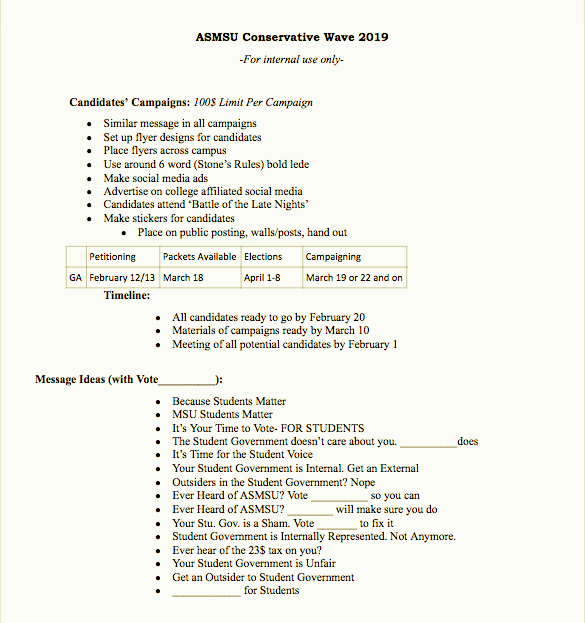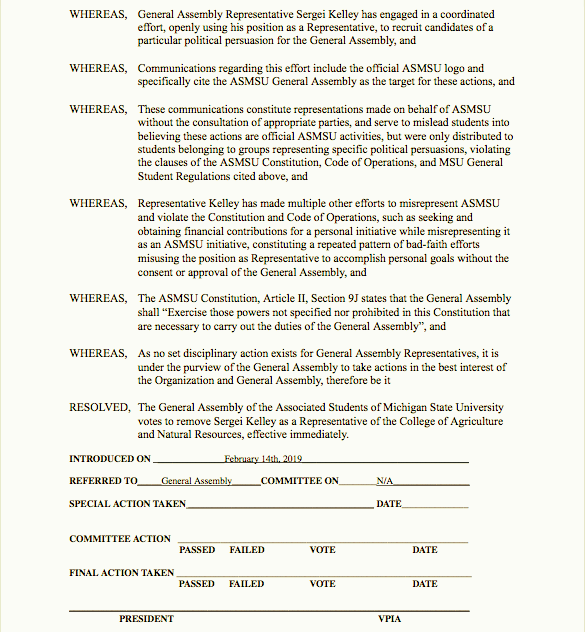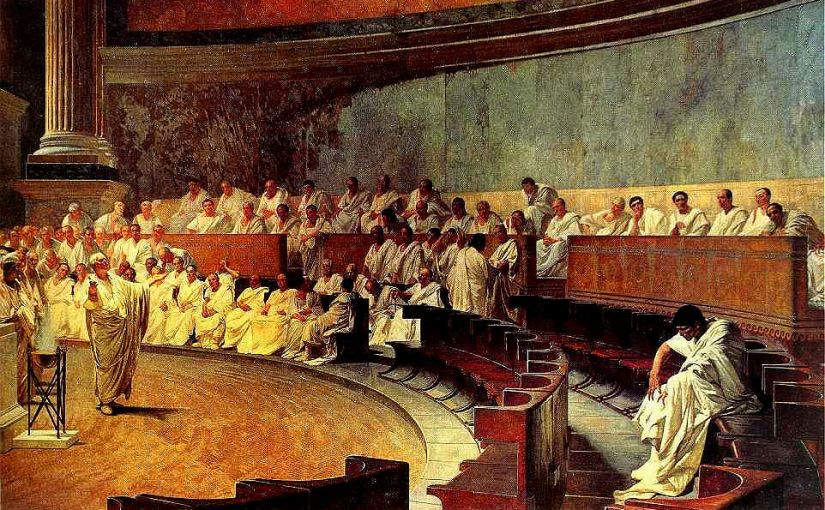On Valentine’s Day ninety years ago, love filled the windy Chicago air as Al Capone and a number of his compadres allegedly gunned down seven members of a rival gang. History, as it is wont to do, attempted to repeat itself last night at the bi-weekly meeting of the General Assembly of the Associated Students of Michigan State University (ASMSU). There the day’s aura of human connection was shattered by the brutal reality of politics. A bill calling for the removal of College of Agriculture and Natural Resources representative and The Morning Watch Executive Editor Sergei Kelley was proposed and a vote to have said bill bypass the usual committee procedures quickly succeeded. The next couple of hours were equally tense and boring, as the organization slowly waded through its bureaucratic and procedural necessities while representative Kelley sat patiently waiting for the debate and vote that would determine his fate. When the debate reared its head, it did so with extreme passion, as copious amounts of frustration and anger bubbled to surface of this oft placid environment. By the end of the discussion, however, the outcome was clear: Sergei Kelley would live to see another day as a representative of ASMSU. And so he did, as a number of other representatives stormed out of the assembly in various states of sorrow and bewilderment. This is the story of how Kelley found himself on the brink of disaster, and why he still woke up today as a member of ASMSU.
Our story begins a few days ago with the vital journalistic work of The Evening Look’s Chief Political Correspondent O. Justice. As a result of his deep and far-reaching connections throughout the political apparatus of this university and his undue fascination with representative Kelley, O. Justice managed to come across the document that would prove the catalyst for this entire debacle. Penned by representative Kelley himself, this document is an eerily unabashed attempt at political strategy. Much like the postwar Soviets, Kelley calls for a red wave to change the nature and makeup of our governing bodies in a flippant attempt to undermine the principles of representation. While Kelley channeling his inner Roger Stone was problematic by itself, in what amounts to an almost comedic reversal of the Clinton email controversy, the use of the ASMSU logo in his email to spread this blueprint for a conservative takeover of the organization is an alleged violation of the organization’s internal rules.


As the bill explains, the ASMSU code of conduct states that “Representations made on behalf of ASMSU are to be neither misleading, incorrect, nor inherently false, and are to reflect organizational policy and opinion”. Thus, by using his official ASMSU email and the organization’s official logo to spread this document, Kelley was misrepresenting the representatives of our student body. The bill also alleges that Kelley’s specific targeting of conservatives violates the Preamble to the ASMSU Elections Code which states “ASMSU does not endorse the use of political slates or unauthorized political endorsements in its election process”. Kelley’s call for a conservative wave obviously neglects even a superficial attempt at bipartisanship, serving the interests of Kelley and his political allies rather than the actual students of MSU.


But the content of the debate revealed that this most recent infraction may not have been the only one on Kelley’s record, as allegations of a similar nature also surfaced in regards to a flag bill from last year, in which Kelley allegedly falsely represented himself as acting on behalf of ASMSU whilst soliciting funding for the distribution of American and MSU flags around campus. While Kelley’s outspoken conservatism amongst a group of mostly liberal representatives certainly did not help his image, it was his own actions that brought him to edge of a forced retirement with no severance package. It was in light of these actions that Lyman Briggs representative Ben Horne drafted a bill calling for the removal of Sergei Kelley from ASMSU. A vote to bypass the normal committee process passed with relative ease, and the stage was set for a monumental struggle. After hours of the procedural matters that dominate these meetings, the bill was returned to the floor and the battle lines were drawn. The opposition to this measure quickly emerged, rooted in an undying faith in the power of democracy.
Horne’s bill references a clause of the Constitution that allows the General Assembly to exercise all “powers not specified nor prohibited in this Constitution that are necessary to carry out the duties of the General Assembly” because there is no specific outlined mechanism for the General Assembly to hold representatives accountable for actions other than poor attendance. Those opposed to Horne’s bill thus espoused fear about setting an improper precedent, whilst also pointing out the existing mechanism of representative accountability: electoral recalls. The ASMSU Constitution states that “A voting member of the General Assembly may be recalled by a simple majority vote of the representative’s constituency through a recall election initiated by a petition containing 10% of the eligible voters of the representative’s constituency”. Such a clause may appear the most reasonable and democratic solution, but some statistics suggest problems with the process. According to the Office of the Registrar, there are 3,243 full-time students in the College of Agriculture and Natural Resources as of Spring 2019. This means that a petition of at least 324 students would be required to trigger a recall vote for representative Kelley, which seems ridiculously large when ASMSU’s own statistics show that Kelley was elected with only 52 votes last April.
Despite the apparent flaws of this system, its existence and the lack of a specific mechanism by which the General Assembly could take punitive action led many to oppose the bill. During the extensive debate over the bill there were two attempts to amend it but both failed. The first amendment would have suspended both his voting and speaking privileges for the next 30 days, while the second one would have only limited his ability to vote for the same period. With neither of these more moderate solutions to the matter at hand having the necessary support, it became fairly clear that Sergei Kelley would survive. Those still supporting his ousting pointed to the need for accountability that the problematic recall system may be unable to provide, but the lack of a precedent or a constitutional process for such action proved untenable for the great majority of ASMSU members. The final vote failed by a vote of 5 to 22, with 8 abstentions. A few of those most committed to his removal stormed out of the meeting prompting a five minute recess. The representatives who stayed may have taken comfort in being on the winning side of the argument, but the entire matter highlighted the problems inherent in a representative democracy suffering a deep disconnect with its voting base.
While ASMSU does take extensive measures to attempt to “get out the vote”, the harsh reality of the situation is that voter turnout remains abysmally low. While leaving accountability in the hands of the voter through a recall vote is potentially the most democratic solution, it seems inappropriate given the apathetic relationship most students appear to have with the organization. The best way forward appears to be a change to the ASMSU Constitution that outlines a clear punitive process for the General Assembly to deal with violations of the code of conduct. Otherwise the complete lack of accountability for repeated abuses of the rules poses a serious threat to the credibility of our representative body.
– The Evening Look Staff
Click here and give us a follow on Twitter for more news, opinion, and satire!


One thought on “Saving Sergei Kelley”